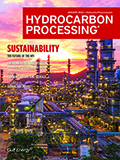
January 2023
Special Focus: Sustainability
Used oils generated through industrial and non-industrial (e.g., locomotives) sources are an industry segment that needs global attention for enhanced circularity.
Improving energy efficiency is an ongoing objective for refineries to benefit operability, throughput and profitability.
Earth’s carbon dioxide levels have increased appreciably within the last several decades, which directly correlates to rising environmental concerns of GHG emissions, pollution and disruptions of marine and terrestrial environments, among others.
Biofuels, Alternative/Renewable Fuels
Hydrocarbon liquid fuels are central to the U.S. economy, delivering almost half the country’s energy to the residential, commercial, industrial and transportation sectors.
All industrial processes require reliable, accurate and timely methods for analyzing process chemistry.
Process Optimization
It is widely accepted that state-of-the-art sulfur recovery technologies utilize the modified Claus process as well as some extension technology on the tail gas.
Heat Transfer
Sensitivity analyses evaluate the effects of changes in certain variables on project simulations or investment economics.1
Valves, Pumps and Turbomachinery
Hazardous materials and dangerous reactions are commonplace in petrochemical, refining and specialty chemical processing units.
Columns
For more than 100 yr, <em>Hydrocarbon Processing</em> has provided the global HPI with the latest advancements in processing technologies, maintenance, safety, engineering and construction, and know-how to improve and enhance refining and petrochemical plant operations.
The Sleipner carbon capture and storage (CCS) project in the North Sea off the coast of Norway was the first storage project on a commercial scale.
Time is running out on transformation for the oil and gas, refining and petrochemical industries.
<em>Hydrocarbon Processing</em> sat down with Pinti Wang, President and CEO, GTC Vorro Technology, to get his insights on sulfur removal processes, technology licensing and other topics within the process industries.
Trends and Resources
The global sustainable aviation fuel (SAF) market is expected to increase from $216 MM in 2021 to $14.77 B by 2030.
Total organic carbon is an important quality parameter in the various manufacturing and process environments that depend on ultrapure water.

- KBR's phenol technology selected by SABIC Fujian Petrochemicals 4/25
- Honeywell Technology helping to produce SAF with lower cost and waste 4/25
- Nigeria's NNPC partners local firm on new 100,000 bpd refinery 4/25
- Stranded cargo shows credit challenges at Nigeria's Dangote refinery 4/25
- Low U.S. distillate consumption reflects slow economic activity and biofuel substitution 4/25
- Clariant catalysts reduce customers’ footprints by 40 million tons of CO2e in 2023 4/25




